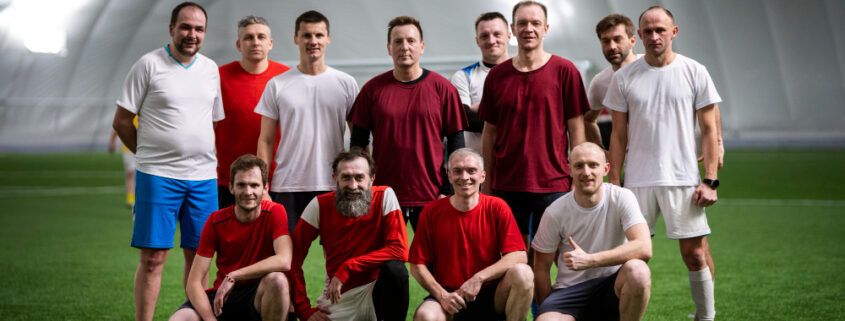How to Build a Winning Soccer Team: Key Factors for Success
Soccer team management is not just a mere combination of great talent in the field. It has always been believed that to be successful, soccer players must work as a team, devise good strategies, and prepare well. This guide will cover all the required aspects of building a winning soccer team.
It includes basic components of any team, management skills, tactics, and ways to analyze the team’s performance in the field. Now let’s get down to the details of what makes a soccer or any other sports team to be successful.
Table of Contents
- Core Components of a Winning Soccer Team
- Team Composition
- Skill Development
- Effective Team Management
- Coaching and Leadership
- Training and Preparations
- Tactical and Strategic Planning
- Game Strategies
- Team Dynamics
- Performance Analysis and Improvement
- Continuous Improvement
- Conclusion
Core Components of a Winning Soccer Team
Every aspect in sight counts, from the players selected to the skills to be employed. It means understanding these key elements so that you are successful in building a winning soccer team with the appropriate resources to experience success.
Team Composition
A very important issue while building a winning soccer team is the team’s composition. Everyone has their position, and it is important to consider such positions. Selecting the right players for each position also sets the stage for this process.
It is possible to have an extensive assessment of the skills that make up a particular occupation and at the same time note that there is strength in balance. Not every player needs to perform in every field, but together, they should have all the capabilities.
Being on good terms with everybody on the team is also important. Soccer is total team play, and the players are required to have good chemistry with each other. When the players can comprehend one another and what makes the other do a certain thing, it is no longer a team of people but a team.
Skill Development
Skill development is the fundamentals of every team. Major elements of soccer to be competed include dribbling, shooting, passing, and tackling. These are generic skills that any player can achieve, but the ability to perfect them distinguishes great teams from average ones.
Another requirement is that each position requires its kind of training. For instance, goalkeepers are required to work extra on show-stopping technique, while midfielders are required to work on the talent of passing the ball. The kind of training offered impacts the players, especially when the training is facilitated according to their positions.
Tactical awareness is another factor that constitutes a major part of the planning and execution system. If a team grasps the utilization of tactics, it can take on any game scenario.
Effective Team Management
The main point is that good management is critical for any team. Player management involves leading players, making decisions, and motivating them.
Coaching and Leadership
A soccer team consists of players who need a good coach; the same applies to a successful soccer team. The head coach is the one who is always by the side of the players and supports them no matter the circumstances. Some common skills with a good coach include good communication, patience, and a good understanding of the tactics.
Many factors determine a team’s success, and leadership styles are critical. Strong leaders do not dictate; they motivate their employees so that they can work efficiently. The players must be motivated to perform optimally on the field and in other aspects of their lives.
The coach is also supposed to accomplish the duties of developing a positive attitude within the team. When the members of that specific team collectively feel like a whole family, they will support one another.
Training and Preparations
Building a winning soccer team involves effective training techniques and providing appropriate training programs. Coaches should ensure that the training allows them to develop the skills of their players and the team’s strategies.
These are very useful, especially to the players, as preparation for play is central to winning games. It includes understanding the opponent and their strategies and finding ways and means of counterattacking them. It also encompasses the players’ mental preparation and the “psyching up” of the players for the battle ahead of them.
See Also A History of Iconic Soccer Rivalries: What Makes Them So Special?
Tactical and Strategic Planning
Soccer revolves around tactics, which are the center of soccer gaming. The fundamental aspect of soccer is competing against an opponent. A lack of plan always causes an issue, even if the player has great potential and talent. Proper tactics guarantee the team will exploit any weakness it finds in the opponent and dominate the game.
Game Strategies
However, it is important to state that offense and defense form the basic strategies of soccer. Tactically, attacking tactics include playing possession soccer or launching quick counterattacks. Defensively, teams can select between a high press, which puts pressure on the opponents at the same position, and a low block, which keeps the goals safe.
Every team is different, and the scenario must be studied differently based on the other team’s strengths and limitations. A team that can adapt during a game is always going to be ahead of the other team.
Tight matches are always slow, and most of the goals are scored from corners or free kicks. Routine drills allow the team to capitalize on such chances, depending on the instructions given during the practice.
Every time a team raises a perfect corner or performs well during a free kick or dead ball situation, the essential strategies of set-piece plays are significant in any team’s strategy.
Team Dynamics
Fundamentally, a soccer team is only as good as the quality of a team’s communication skills. Better communication during the game makes the flow smooth and easy, and everybody will know what to do or where to go. It means that the players must learn when it is time to pass.
Similarly, they must know when it is time to shoot or when it is time to defend, and this is all dependent on communication. Conflict management may be critical in sustaining the team’s focus.
Conflicts should be resolved as soon as possible so they do not interfere with the team’s performance. Motivation is also a major factor in maintaining the team’s high morale, especially after a loss or after a difficult period.
System trust is established gradually, and even an experienced team is a work in progress. Therefore, the construction of all these elements involves practice in the field and off-the-field fellowship.
Performance Analysis and Improvement
Any soccer team that participates in matches is always developing or progressive. Performance analysis assists in noting strengths and areas that need focus when building a winning soccer team.
Performance Metrics
Some of the most used Performance Indicators in soccer are pass success rate, shooting efficiency, and possession. These indicators give an idea about the team’s effectiveness and the areas that require enhancement.
Using statistics to discuss the game results also gives the coaches and the players insight into the performance. Analyzing the games’ videos and statistics indicates how the team may perform in other matches, allowing the team to change its strategies.
Data is also used to make changes, learn from what has happened on the business level, and fine-tune it from the top. It improves decisions for the enhancement of the specific player and the overall strategy of the entire team.
Continuous Improvement
Continuous improvement is why many coaches are always required to give feedback on some of the areas a player needs to work on. Criticism helps one develop and increase competency, particularly for players when building a winning soccer team.
For that reason, fostering this culture of growth in the organization is equally important. It will also enable the players to feel that challenges are a positive thing that must be embraced to foster improvement.
Even a simple victory in a tournament or changing a particular technique that a team employs on the field. These goals, combined, contribute to the achievement of the massive goals. It, in turn, fosters confidence and paves the way for more accomplishments.
Conclusion
Building a winning soccer team requires time, energy, hard work, and passion. Thus, performance analysis and a constant improvement process are critical aspects of the game. It is worth mentioning that having a winning team takes time and is not developed overnight.
So, following these key factors outlined in this guide will make it easier to achieve success in soccer and sustainable success.



